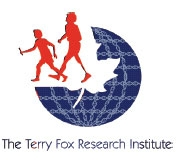National early detection study aims to improve lung cancer survival rates
September 17, 2008
The Terry Fox Research Institute (TFRI) and the Canadian Partnership Against Cancer announce the launch of a nationwide lung cancer detection study, involving 2,500 current and former smokers in seven cities across Canada. The study has the potential to revolutionize the detection and treatment of lung cancer, which remains Canada’s leading cause of cancer deaths.
 This made-in-Canada program begins today, with study sites in Vancouver, Calgary, Toronto, Hamilton, Ottawa, Quebec City and Halifax. It uses a unique combination of a questionnaire and tests of blood and breath to determine the effectiveness of these readily accessible and low cost detection techniques for lung cancer as a first step in early detection, streaming those identified as being at higher risk to the costlier but more sensitive spiral CT and bronchoscopy.
This made-in-Canada program begins today, with study sites in Vancouver, Calgary, Toronto, Hamilton, Ottawa, Quebec City and Halifax. It uses a unique combination of a questionnaire and tests of blood and breath to determine the effectiveness of these readily accessible and low cost detection techniques for lung cancer as a first step in early detection, streaming those identified as being at higher risk to the costlier but more sensitive spiral CT and bronchoscopy.
This study is of vital importance, according to lead researchers Dr. Stephen Lam and Dr. Ming Tsao, who note that, “Early detection and treatment of lung cancer is the most promising way to reduce lung cancer mortality, and could see a five-year survival rate of over 70 per cent instead of the current 16 per cent* thats more than quadruple the success rate without early intervention.”
The study recognizes the need to create a lung cancer detection program and infrastructure that is both timely and affordable within the Canadian health-care system. The study incorporates data such as a family history of lung cancer, the presence or absence of chronic obstructive lung disease and body height and weight, in addition to smoking history and age, to determine lung cancer risk.
The study will also examine whether a simple breathing test to measure lung capacity and a blood test can improve the accuracy of prediction, which ultimately would help reduce the challenges associated with false positives in spiral CT scans.
TFRI Scientific Director Dr. Victor Ling believes that study participants will be helping to make history in cancer research. “This is an international first,” says Ling. “By using low-cost techniques to identify individuals who are at risk and recommending them for more in-depth examination, we have the potential to significantly increase both the effectiveness and the reach of lung cancer detection.”
The study builds on the best of current international trials in lung cancer detection, says Dr. Heather Bryant, VP of Cancer Control at Canadian Partnership Against Cancer. “An important aspect of this study is that it is a cost-effective way to work with other international initiatives,” she says. The study will give us important information on how to approach any eventual nationwide approach to early detection in lung cancer, she says.
Lung cancer is the leading cause of cancer death in Canada and around the world, killing 20,000 in Canada* and 1.2 million worldwide. That is more than colorectal, breast and prostate cancers combined. By 2020, it is projected that lung cancer will be the fifth highest killer among all diseases.**
Current and former smokers between the age of 50 and 75 who are interested in participating are urged to call the toll-free study registration line at 1-888-505-TFRI (8374).
About TFRI and Canadian Partnership Against Cancer
Founded and funded by The Terry Fox Foundation, the Terry Fox Research Institute (TFRI), is a Canada-wide not-for-profit institute with headquarters in Vancouver, British Columbia. It works in partnership with provincial cancer research and care organizations dedicated to ensuring today’s best cancer science becomes tomorrow’s affordable medicine. TFRI was established in October 2007, with funding from the Province of British Columbia and the Terry Fox Foundation.
Columbia. It works in partnership with provincial cancer research and care organizations dedicated to ensuring today’s best cancer science becomes tomorrow’s affordable medicine. TFRI was established in October 2007, with funding from the Province of British Columbia and the Terry Fox Foundation.
The Canadian Partnership Against Cancer is an independent organization funded by the federal government to accelerate action on cancer control for all Canadians. The Partnership brings together cancer survivors, patients and families, cancer experts and government representatives to work towards this aim. Its mandate is to be a driving force to achieve a focused approach, helping to prevent cancer, enhance the quality of life of those affected by the disease, decrease mortality and make cancer control more efficient.
Media contacts
Pam Ryan
Terry Fox Research Institute
(604) 317-7262
Lisa Marchitto
Canadian Partnership Against Cancer
(416) 915-9222
